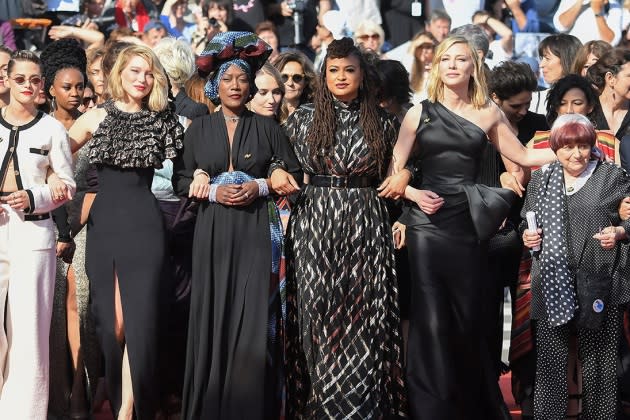Cannes: Relaunched French 50/50 Organization Fact-Checks Fest on Female Representation

Last year at Cannes, there was a notable void in the vocal female activism that has characterized the festival since the start of the #MeToo movement, as both Time’s Up U.S. and its French corollary, Collectif 50/50, had recently imploded in controversy.
But unlike Time’s Up, which is now effectively defunct in the U.S., the French organization has relaunched with a new board — a group that is younger, less famous and more demographically diverse than its predecessor — and a new sense of purpose.
More from The Hollywood Reporter
Cannes: Sony Pictures Classics Acquires Fernando Trueba's Animated 'They Shot the Piano Player'
Cannes: 'Asteroid City' Newcomer Grace Edwards on Making Her Wes Anderson Debut
Cannes Flashback: The Fest Bore 'Witness' to Harrison Ford's Star Power
“None of us is a celebrity, which is quite a change,” says new Collectif 50/50 board member Laura Pertuy, a film programmer and journalist.
Here at Cannes, the group is holding panels spotlighting female composers and inclusion initiatives in countries like Egypt and Brazil. And it’s also providing a fact-check on the festival’s claims of progress on the gender front — Cannes has touted its record six female directors among the 19 competition films this year.
“How can they be so proud?” Pertuy says, pointing out that at Cannes overall this year, including the official selection, Directors’ Fortnight, Critics’ Week and ACID sections, just 31 percent of films are directed by women. At a private fundraising event that the group is set to host this weekend in Cannes, it will announce the results of a study contrasting the French festival’s record on gender with those of the Berlin and Venice film festivals, which are both ahead on inclusion, Pertuy says. “Berlin is really doing the work,” she says.
Pertuy also took issue with Cannes chief Thierry Frémaux’s comment to journalists Monday, answering a question about the complacency of the festival toward sexual predators. “If you believed it, you would not be here, listening to me now, taking your accreditations and complaining about the press screenings for a festival of rapists,” Frémaux said. Pertuy responds: “He wants to push our buttons. Well, our place is also in Cannes. We don’t need him.”
While the former Collectif 50/50 board was all female and predominantly directors and producers, the new board, which formed last June after a vote of the group’s more than 1,000 members, includes nine women and five men, with industry craftspersons, film programmers and actresses represented.
“Maybe it’s less glamorous, but we have a group of people who sincerely believe in inclusion and gender parity and are willing to work for it,” says producer Laurence Lascary, a former board member. “There are still challenges, but I trust the new board.”
Among the first hurdles for the new board has been fundraising. This spring, the National Center for Cinema in France, 50/50’s primary source for financing, cut its support by 50 percent. “A lot of people believe we don’t exist anymore,” Pertuy says. “And some in the industry are not as interested as they were before.”
The group has continued a relationship with Netflix, and grown its mentorship program to 250 people matched with industry mentors.
The Collectif is rebuilding after a crisis last spring when a Black actress accused a white female producer on its board of groping her at a party. Amid the fallout, which included a tense meeting in a Paris cinema, the entire Collectif 50/50 board eventually resigned.
Some members of the Collectif see the resulting controversy as convenient for industry institutions that had been resistant to the changes the group was pushing. “In France we say, if you want to get rid of your dog, you accuse it of having rabies,” Lascary says.
The Collectif had formed in a moment that seemed full of possibility in 2018, at the first Cannes following the toppling of Harvey Weinstein, when prominent women attending the festival including French directors Céline Sciamma and Rebecca Zlotowski staged a dramatic march up the Palais stairs. Together with Time’s Up U.S. and U.K., and women’s groups in Italy and Greece, the Collectif persuaded the three male artistic directors of the festival to sign a pledge to compile gender statistics on movies submitted to Cannes, improve transparency around selection processes and work toward parity on executive boards.
As the group reconstituted after the scandal, part of its process has been undergoing training on how to communicate. “We didn’t hide from what happened,” says Pertuy. “We’ve been willing to talk about it with our members.”
For Lascary, the organization’s voice is important, as industry efforts on inclusion begin to stall. “What we’re facing today is a backlash,” she says. “And it shows that the fight is far from being over.”
Best of The Hollywood Reporter
